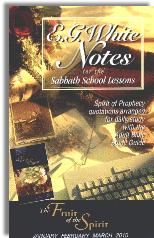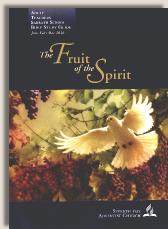|
||||||||||||||
Commentary on "Introduction to The Fruit of the Spirit"
The lessons for this quarter are drawn primarily from the passage in Galatians regarding the fruit of the Spirit. Gal. 3:22-23 reads as follows:
But the fruit of the Spirit is love, joy, peace, patience, kindness, goodness, faithfulness, gentleness, self-control; against such things there is no law.*
The lesson for each week will cover one of these fruits of the Spirit, as well as three other items. For week one, the subject is that “by their fruit you shall know them” with the teaching that one can know a tree by its fruit. The twelfth and thirteenth weeks will cover the topics of Truth and Christian Character. Although not listed in scripture as “fruit of the Spirit” these are related to the subject.
The Quarterly begins with a “silly story” on page 2 of the Teacher’s Quarterly. I must agree with the lesson author, this is a silly story. Actually, “silly” is being too kind. The story can be damaging as the actual “facts” related are too far-fetched to be believable. Why tell such a fantastic story? One purpose of telling such a story is to portray Christians as hypocrites who do not live up to their profession. A story such as this one is often told by non-Christians for one purpose only: to denigrate Christianity and those who claim to believe in the Christian message.
In the professional world, I used to hire a top-notch leadership trainer for one of my programs. During the introduction to his session of the workshop, he would draw the Christian fish symbol on the board and ask the audience what this was. He would then ask the participants for examples of how those people drove their cars, which had this symbol. You can probably imagine the resulting conversations. His primary purpose? To show leaders and managers their responsibility to perform according to their profession. His secondary purpose? To show how ridiculous Christians are in professing one thing and practicing something contrary. He achieved his secondary purpose much better than his primary purpose.
What Christian is not aware, sometimes painfully so, of the difference between their belief and their practice? No less a man than the Apostle Paul battled with this problem in his life and, inspired by the Holy Spirit, provided us with two of the most potent chapters in all of scripture, Romans 7 and 8. When a non-Christian points out the differences between belief and practice, we can understand their dilemma, for they often do not understand the battle between the old and the new man. For a Christian to point this out is to do something contrary to Scripture and the Holy Spirit.
Jesus himself told us to pull the mote (log) out of our own eye so that we can pull the splinter out of our brother’s eye. As Christians, we are called to de-mote ourselves while keeping the body of Christ from being splintered. Philippians 2:1-4 is clear on this:
Therefore if there is any encouragement in Christ, if there is any consolation of love, if there is any fellowship of the Spirit, if any affection and compassion, make my joy complete by being of the same mind, maintaining the same love, united in spirit, intent on one purpose. Do nothing from selfishness or empty conceit, but with humility of mind regard one another as more important than yourselves; do not merely look out for your own personal interests, but also for the interests of others.
As we study the fruit of the Spirit we must approach the subject from a Scriptural standpoint. Jesus said in John 13:35, “By this all men will know that you are My disciples, if you have love for one another."
The remainder of the introduction is very good, with one exception. The lesson author states the following on page 3 of the Teachers Quarterly:
This is the heart of the matter. God’s purpose is to make us like Jesus, and He has sent the Holy Spirit to dwell in us to make that change happen.
Jesus gave an extensive teaching about the purpose of sending the Holy Spirit to the disciples. It was not to make us like him. Make no mistake, when we are in Christ we will become more like him, but the process will never be complete until we see him as he is. This is stated for by the Apostle John in 1 Jn. 3:2:
Beloved, now we are children of God, and it has not appeared as yet what we will be. We know that when He appears, we will be like Him, because we will see Him just as He is.
As we proceed through the lessons this quarter, let us keep in mind a point the lesson author makes when he says:
We never must forget that the fruit of the Spirit is just that – the “fruit,” the result of salvation, not the means. The means is always Jesus and what He has done for us, which we claim by faith.
One final note on the word “Spirit”: The word Spirit in the Greek is pneuma. Many translators believe this should always be translated as “wind” or “breath.” In certain contexts this is correct. However, in these passages referring to God himself, we must understand that God himself is Spirit. God is not “wind” or “breath,” he is a person. With this understanding, we must also come to realize that our inner person, our spirit, is not “wind” or “breath” but a vital, living being. If God the Spirit is love, joy, peace, patience, gentleness, kindness and self-control, we must come to realize that these are not fleshly attributes, but spiritual attributes that can be seen in the physical world.
If your spirit has not been made alive (“born again” or “born from above”) then the fruit of the Spirit will have no effect in your life or the lives of those you touch. Ask Jesus to give you new life, ask him to bring your dead spirit to life and then you will truly be able to experience the fruit of the Spirit in your life, and you will recognize in the lives of other Christians when you meet them.
Summary
- The fruit of the Spirit is love, joy, peace, patience, kindness, goodness, faithfulness, gentleness, self-control.
- The “silly story” provided in the introduction is not only silly; it is used against Christians and can be damaging to the Christian message.
- As Christians it should never be our intention to find faults in others. We are to think of others as better than ourselves (Phil. 2:1-4) and build one another up in the faith.
- The Spirit is not “wind” or “breath” as some translators would prefer it to be rendered. God is Spirit – this is his very essence. We have a spirit which is not just our breath.
- Read Romans 7 and 8 to see the issues that the Apostle Paul, inspired by the Holy Spirit, wrote about for our edification. Understanding the body/spirit duality of man is important if we are going to understand the fruit of the Spirit.
* Unless otherwise indicated, scripture references are from the New American Standard Bible, Updated 1995 (NASB).
Copyright 2009 BibleStudiesForAdventists.com. All rights reserved. Revised December 24, 2009. This website is published by Life Assurance Ministries, Glendale, Arizona, USA, the publisher of Proclamation! Magazine. Contact email: BibleStudiesForAdventists@gmail.com.
The Sabbath School Bible Study Guide and the corresponding E.G. White Notes are published by Pacific Press Publishing Association, which is owned and operated by the Seventh-day Adventist church. The current quarter's editions are pictured above.
Official Adventist Resources
Standard Edition Study Guide Introduction
Teacher's Edition Study Guide Introduction


